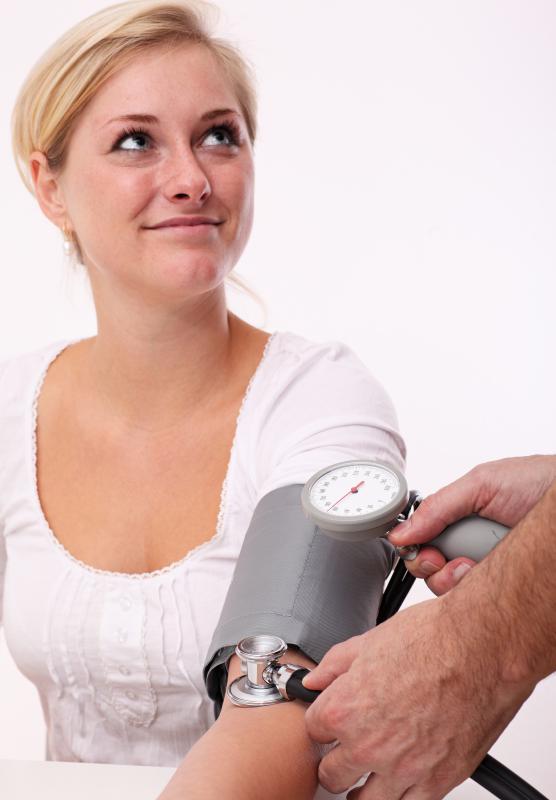At WiseGEEK, we're committed to delivering accurate, trustworthy information. Our expert-authored content is rigorously fact-checked and sourced from credible authorities. Discover how we uphold the highest standards in providing you with reliable knowledge.
What are the Risks of Hypertension?
Hypertension or high blood pressure is associated with numerous risks. Controlling it through blood pressure medication can reduce but not eliminate all risks. Though certain groups of people are more predisposed to hypertension, sometimes it occurs in people who seem otherwise healthy. However, most experience high blood pressure as they age or if they are obese. People of African descent are in a slightly higher risk group for developing this condition that is not related to weight gain or age. As well, those under extreme stress are at higher risk for it.
A main causal factor in stress to the kidneys, as blood pressure rises, excess fluid accumulates in the body. The kidneys must work harder to handle the extra fluid, and frequently become overworked as a result. Uncontrolled hypertension is responsible for about 15,000 new cases of kidney failure a year in the US alone.

Hypertension is also indicated in increased risk for stroke. It can also result in the hardening of the arteries, which is called atherosclerosis. This condition makes it easier for blood clots to form in narrowed pathways. High blood pressure is also a major cause of heart attacks.
Those with hypertension can also go into heart failure, a gradual process where the heart begins to work less and less efficiently. Though medications can help reduce heart failure, late stage failure is a major cause of death. As well, the overworked heart can gradually enlarge, which again causes inefficiency of the heart muscles.

Those with hypertension are more prone to experiencing angina, which is extreme chest pain. They have also shown to be more prone to retinal damage and vision impairment. Some with this condition may be at increased risk for bleeding in the brain, particularly due to either blood clots or aneurysms.
In all, the risks of hypertension are varied and most are quite serious. In many cases, it can be controlled by changes in diet and exercise. When these alone fail to reduce blood pressure, medication is usually added. If it is already causing fluid retention, it is quite common for people to also be on diuretics, which help the body shed excess fluid. Heart symptoms like failure and angina may also be controlled with medication. Anti-coagulants like aspirin or warfarin are also added to prevent clotting.

Blocked or hardened arteries may require surgery to open or bypass blockages. As well, heart surgery, or implantation of a pacemaker may be needed to address a slowing heart rhythm or an inefficient heart. Often these treatments can help reduce risks when high blood pressure remains controlled.
AS FEATURED ON:
AS FEATURED ON:















Discussion Comments
Sunny27- I agree with you, but some patients need medication to control their condition. According to the Mayo Clinic many of these medications include, Capoten, Diovan, Lopressor, and Norvasc.
Catapult43- I agree that a healthy diet prevents high blood pressure, but I also heard that exercise also lowers blood pressure because it makes the heart more efficient.
Also, exercise lowers stress levels in the body which is a leading factor in hypertension cases. I think a combination of sound nutrition along with regular exercise should help the hypertensive patient.
It is very important to maintain low blood pressure. Of course medication is one way, but diet is also very important. Eating food with high content of potassium, such as bananas, citrus fruit, fish, green leafy vegetable among others, lowers blood pressure. People with kidney problems however, have to avoid potassium, therefore it is important to consult with a doctor.
Post your comments